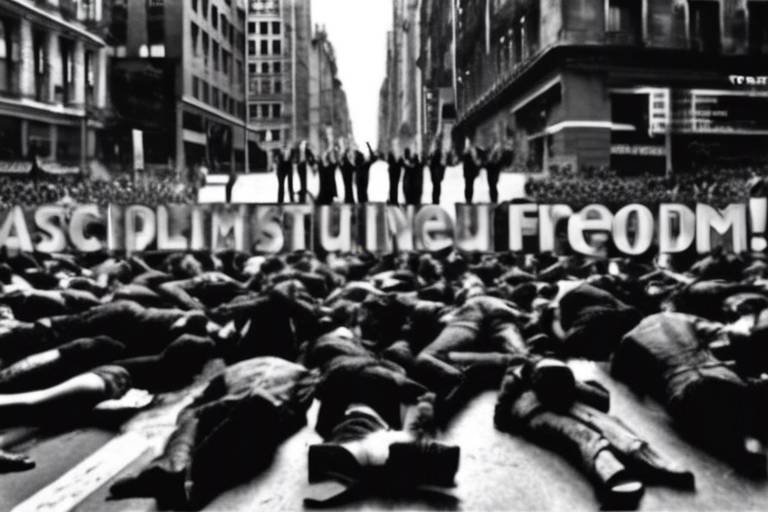Sartre's Existentialism and Human Emotions
Welcome to the fascinating world of Jean-Paul Sartre's existentialism, where the complexity of human emotions meets the profound philosophy of existence. At the heart of Sartre's thought lies the idea that we are not merely defined by our circumstances or inherent traits, but rather by the choices we make and the actions we take. This philosophy invites us to explore how our emotions are shaped by the freedom we possess and the responsibilities that accompany that freedom. Imagine standing at a crossroads, where every path represents a different choice—each step forward not only defines who you are but also influences your emotional landscape. How do we navigate this intricate web of decisions, and what does it mean for our emotional experiences?
Sartre's existentialism challenges us to confront the reality that existence precedes essence. This means that rather than being born with a predetermined purpose or identity, we create our own meaning through our choices. Consider the implications: if you are the architect of your own life, then your emotional responses are not just reactions but are intricately tied to the decisions you make. This perspective can be both liberating and daunting. It raises questions like, "What does it mean to live authentically?" and "How do our choices reflect our true selves?"
As we delve deeper into Sartre's philosophy, we uncover the essential themes of freedom and responsibility. These concepts are not just abstract ideas; they are the very fabric of our emotional experiences. When we embrace our freedom, we must also acknowledge the weight of our choices. Every decision we make carries emotional significance, shaping not only our self-perception but also our relationships with others. This is where the beauty and complexity of human emotions come into play. Each choice can evoke a spectrum of feelings—joy, regret, anxiety, or fulfillment—depending on how aligned those choices are with our true selves.
In essence, Sartre's existentialism serves as a mirror reflecting our emotional states. It invites us to examine how we relate to our freedom and the choices that define us. As we navigate through life, we often find ourselves grappling with the consequences of our decisions. This leads us to the crucial understanding that our emotions act as indicators of our existential state. They reveal not only our struggles with freedom and choice but also the inherent absurdity of life. So, when you feel overwhelmed by despair or elation, consider it a prompt for deeper reflection on your existence and the choices that led you there.
In conclusion, Sartre's exploration of human emotions through the lens of existentialism offers profound insights into our lives. By recognizing that we are the authors of our own stories, we gain the power to shape our emotional experiences. So next time you feel a rush of emotion, ask yourself: "What choice led me here?" and "How can I embrace my freedom to create a more authentic emotional life?"
- What is existentialism? Existentialism is a philosophical movement that emphasizes individual freedom, choice, and responsibility, asserting that existence precedes essence.
- How does Sartre view emotions? Sartre sees emotions as indicators of our existential state, reflecting our struggles with freedom and the choices we make.
- What is the significance of authenticity in Sartre's philosophy? Authenticity involves making choices that align with one's true self, fostering genuine emotions and deeper connections with others.
- Why is responsibility important in existentialism? Responsibility is crucial because it accompanies our freedom to choose, influencing our emotional well-being and relationships.

The Nature of Existence
Jean-Paul Sartre's philosophy fundamentally challenges our preconceived notions about what it means to be human. At the core of his existentialist thought is the provocative assertion that existence precedes essence. This means that we are not born with a predetermined purpose or identity; rather, we create our own meaning through our choices and actions. Imagine a blank canvas—each decision we make is like a brushstroke that shapes our unique masterpiece. This perspective has profound emotional implications, as it places the responsibility of defining oneself squarely on the individual.
Sartre argues that we are not merely passive observers in our lives; we are active participants. This active engagement with existence can be both liberating and daunting. On one hand, the freedom to choose allows us to explore our desires and aspirations. On the other hand, it can evoke feelings of anxiety and uncertainty. When we realize that our choices shape not only our identities but also our relationships and the world around us, the emotional weight of those choices becomes apparent.
Consider how our decisions impact not just our lives, but also the lives of those around us. For instance, when we choose a career path or a partner, we are not just making personal choices; we are also influencing the emotional landscape of others. This interconnectedness emphasizes the importance of being mindful in our decision-making. Sartre’s existentialism encourages us to reflect on our choices and recognize their ripple effects, which can lead to a deeper understanding of our emotional experiences.
Moreover, Sartre's philosophy invites us to confront the reality that we are constantly in a state of becoming. Our identities are not fixed; they evolve as we navigate through life's myriad choices. This dynamic nature of existence can lead to feelings of excitement and possibility, but it can also provoke existential angst. In moments of uncertainty, when we grapple with questions like “Who am I?” or “What do I truly want?” our emotions can become turbulent. It's during these times that Sartre’s emphasis on personal responsibility becomes crucial, urging us to embrace our freedom and the inherent weight that comes with it.
Ultimately, Sartre's exploration of existence compels us to acknowledge that we are the architects of our own lives. By recognizing that we have the power to shape our identity and emotional experiences, we can approach life with a sense of purpose and authenticity. In this way, the nature of existence is not just a philosophical concept; it is a call to action, a reminder that our choices matter and that we have the agency to create a meaningful life.
- What does "existence precedes essence" mean? It means that individuals are not born with a predetermined purpose; instead, they create their own identity and meaning through their choices.
- How does Sartre's philosophy relate to emotions? Sartre argues that our emotions are deeply intertwined with our freedom and choices, reflecting our existential state and prompting self-reflection.
- Can existentialism lead to anxiety? Yes, the recognition of freedom and responsibility can evoke anxiety, as individuals confront the weight of their choices and the uncertainty of existence.

Freedom and Responsibility
In the realm of existentialism, freedom is not just a gift; it’s a double-edged sword. Jean-Paul Sartre famously claimed that we are "condemned to be free," meaning that with every choice we make, we also bear the weight of responsibility for those choices. This notion can be daunting, as it places the onus of our emotional experiences squarely on our shoulders. Imagine standing at a crossroads, each path representing different choices and outcomes. The freedom to choose can be exhilarating, yet it also brings a profound sense of responsibility. This is where the emotional landscape becomes intricate and often overwhelming.
When we embrace our freedom, we are also acknowledging the consequences that come with it. Every decision we make shapes not only our own lives but also the lives of those around us. For instance, consider a simple choice like moving to a new city. This decision may bring excitement and new opportunities, but it also entails leaving behind friends and familiar places, which can lead to feelings of loss and nostalgia. In this way, our freedom to choose is inextricably linked to our emotional well-being.
Sartre emphasizes that the burden of responsibility can lead to a range of emotions, from joy and fulfillment to anxiety and regret. When we act in accordance with our true selves, we experience a sense of authenticity that enriches our emotional lives. However, when we make choices that are influenced by societal expectations or external pressures, we risk feeling inauthentic, which can lead to emotional turmoil. This struggle between authenticity and societal expectations is a central theme in Sartre’s work, and it resonates with many of us today.
Moreover, the emotional implications of our freedom extend beyond personal choices. Sartre argues that our actions have a ripple effect on others, shaping their experiences and emotions as well. This interconnectedness can create a sense of community and support, but it can also lead to feelings of guilt or remorse when we realize that our choices have harmed others. For instance, if a person chooses to pursue a career at the expense of their family life, they may experience deep feelings of guilt, knowing that their freedom has negatively impacted their loved ones.
Ultimately, navigating the complex relationship between freedom and responsibility requires a delicate balance. We must learn to embrace our freedom while also recognizing the weight of our choices. This balance is crucial for fostering emotional resilience and authenticity in our lives. As Sartre suggests, living authentically means making choices that reflect our true selves, allowing us to connect more deeply with our emotions and with others.
In conclusion, the interplay between freedom and responsibility is a fundamental aspect of our emotional experiences. By acknowledging the weight of our choices, we can cultivate a deeper understanding of ourselves and the world around us. So, the next time you find yourself at a crossroads, remember that your freedom is both a gift and a responsibility, shaping your emotional landscape in profound ways.
- What does Sartre mean by "condemned to be free"? Sartre suggests that while we have the freedom to make choices, this freedom comes with the burden of responsibility for those choices.
- How do our choices affect our emotions? Every choice we make can lead to a range of emotions, influencing our sense of authenticity and our relationships with others.
- Can freedom lead to feelings of guilt? Yes, when our choices negatively affect others, we may experience guilt or regret, highlighting the interconnectedness of our decisions.
- What is the importance of living authentically? Living authentically allows us to make choices that align with our true selves, fostering genuine emotions and deeper connections with others.

The Weight of Choices
Every choice we make in life is like a pebble thrown into a pond; it creates ripples that extend far beyond the initial splash. According to Sartre, our decisions are not merely trivial selections; they carry emotional weight that shapes our identity and influences our relationships. When we choose, we reveal our values, desires, and motivations, and these choices can significantly impact our emotional well-being. Imagine standing at a crossroads, each path representing a different life choice. The road you take defines not just your destination but also the experiences and emotions you will encounter along the way.
For instance, consider the decision to pursue a career that aligns with your passions versus one that offers financial security but lacks personal fulfillment. The emotional implications of such a choice can be profound. Choosing passion may lead to joy and excitement, while opting for security could foster feelings of comfort but also potential regret over unfulfilled dreams. This illustrates how our choices are intertwined with our emotional landscape, creating a complex web of feelings that often oscillate between happiness and sorrow.
Furthermore, Sartre suggests that our choices do not exist in isolation; they resonate with others. When we make a decision, we are not just affecting ourselves but also those around us. For example, choosing to end a relationship can bring about a wave of emotions not only for the individual making the choice but also for the partner, friends, and family involved. This interconnectedness amplifies the emotional weight of our decisions, as we must navigate the potential consequences that ripple through our social circles.
Ultimately, understanding the weight of our choices is crucial for personal growth. It encourages us to reflect on our decisions and their implications, fostering a deeper awareness of ourselves and our place in the world. By acknowledging that our choices carry emotional significance, we empower ourselves to make decisions that are not only rational but also aligned with our authentic selves.
- What does Sartre mean by "existence precedes essence"?
Sartre's phrase implies that individuals are not born with a predetermined purpose; instead, they create their own essence through their choices and actions. - How does freedom relate to responsibility in Sartre's philosophy?
Freedom in Sartre's existentialism comes with the burden of responsibility, meaning individuals must own the consequences of their choices. - What role do emotions play in existentialism?
Emotions serve as indicators of our existential state, reflecting our struggles with freedom, choice, and the absurdity of life. - How can we make authentic choices?
To make authentic choices, individuals should align their decisions with their true selves, fostering genuine emotions and connections with others.

Authenticity in Decision-Making
When we talk about authenticity in decision-making, we’re diving deep into the essence of what it means to be truly human. Sartre believed that living authentically is all about making choices that resonate with our true selves. Imagine standing at a crossroads, where one path is paved with expectations and societal norms, while the other is rugged and uncertain, yet it reflects your genuine desires. Which path would you take? This metaphor encapsulates the struggle many of us face daily, as we navigate the complex landscape of personal choices.
Authenticity isn't just a buzzword; it's a vital component of emotional health. When we make decisions that align with our core values, we foster genuine emotions and deeper connections with others. Think about it: how often do you feel a sense of peace and fulfillment after making a choice that truly reflects who you are? On the flip side, when we act inauthentically—perhaps to fit in or to meet someone else's expectations—we often experience a disconnect that can lead to feelings of anxiety, frustration, or even despair.
Sartre argues that this disconnect arises because inauthenticity robs us of our freedom. We start to live for others instead of for ourselves, which can create a whirlwind of emotional turmoil. To illustrate this point, consider a few scenarios:
- Choosing a Career: Opting for a job solely for its prestige rather than for personal fulfillment can lead to long-term dissatisfaction.
- Relationships: Staying in a friendship or romantic relationship out of obligation rather than genuine connection can cause emotional strain.
- Social Expectations: Attending events or engaging in activities just to fit in can lead to feelings of emptiness.
In each of these cases, the emotional consequences of inauthentic choices can be profound. Sartre emphasizes that by embracing our freedom to choose authentically, we not only honor ourselves but also enrich our emotional experiences. This authenticity allows us to build stronger, more meaningful relationships, as we interact with others from a place of true self-awareness.
Moreover, authenticity in decision-making encourages a sense of ownership over our lives. It empowers us to take responsibility for our choices, which is a cornerstone of Sartre's existential philosophy. When we own our decisions, we can reflect on their impact, learn from our experiences, and grow emotionally. This process of reflection is crucial; it helps us understand not just what we want, but why we want it, allowing for deeper self-discovery.
In conclusion, authenticity in decision-making is not merely an ideal; it's a practical approach to living a fulfilling life. By making choices that align with our true selves, we cultivate emotional resilience and foster genuine connections with others. So the next time you find yourself at a crossroads, remember Sartre's wisdom: choose the path that resonates with your authentic self, and watch as your emotional landscape transforms.
- What does it mean to live authentically? Living authentically means making choices that reflect your true self and values, rather than conforming to external expectations.
- How can I make more authentic decisions? Start by identifying your core values and desires. Reflect on your choices and ask yourself if they align with who you are.
- What are the emotional benefits of authenticity? Authenticity can lead to increased emotional well-being, deeper connections with others, and a greater sense of fulfillment in life.

Consequences of Inaction
In the realm of existentialism, particularly through the lens of Jean-Paul Sartre, the consequences of inaction can be profoundly debilitating. Imagine standing at a crossroads, where each path represents a different choice, a different facet of your life. Sartre argues that when we choose not to choose, we are essentially allowing life to dictate our direction, which can lead to a deep sense of regret and despair. The emotional toll of inaction is not merely a fleeting feeling; it can become a persistent shadow that looms over our existence.
This phenomenon, often described as the “existential vacuum,” manifests when individuals fail to engage with their freedom. The weight of missed opportunities can accumulate, creating a burden that is heavy to bear. Sartre emphasizes that inaction is a choice in itself, and this paradox can lead to a cycle of self-blame and emotional turmoil. When we hesitate to act, we may find ourselves trapped in a loop of “what-ifs,” questioning our decisions and their implications on our lives.
Consider the following emotional consequences of inaction:
- Regret: The feeling of wishing you had acted differently can haunt you, leading to a constant replay of missed opportunities.
- Despair: A sense of hopelessness can arise when one realizes that time is slipping away without meaningful action.
- Alienation: Inaction can create distance in relationships, as others may perceive your hesitance as a lack of commitment or interest.
- Stagnation: Emotionally and psychologically, inaction can lead to a state of inertia, where personal growth feels impossible.
Moreover, Sartre highlights that the emotional weight of inaction can extend beyond the individual. When we fail to make choices, we not only affect our own lives but also the lives of those around us. Relationships can suffer, and connections may weaken, as others may feel neglected or unvalued. This ripple effect illustrates how our emotional states are intertwined with the choices we make—or fail to make.
Ultimately, the consequences of inaction serve as a stark reminder of our freedom and the responsibility that accompanies it. Sartre’s philosophy encourages us to confront our fears and take decisive action, for it is through our choices that we carve out our identities and navigate the complexities of our emotional landscapes. Inaction may seem like a safe haven, but it often leads to a more profound sense of discontent, urging us to embrace our freedom and the inevitable consequences that come with it.
- What does Sartre mean by "existence precedes essence"? This phrase suggests that individuals are not born with a predetermined purpose; instead, they create their own meaning through choices and actions.
- How does inaction affect relationships? Inaction can create feelings of neglect and distance, as others may perceive a lack of commitment or interest in the relationship.
- What is the "existential vacuum"? It refers to a state of emptiness and lack of meaning that arises when individuals fail to engage with their freedom and make choices.
- How can one overcome the fear of making choices? Embracing the idea that every choice carries weight can empower individuals to act, recognizing that inaction often leads to greater regret.

Emotions as Existential Indicators
In the realm of existentialism, emotions are not just fleeting feelings; they serve as profound indicators of our existential state. Jean-Paul Sartre argues that our emotional experiences are deeply intertwined with our freedom, choices, and the inherent absurdity of life. When we feel joy, sadness, anger, or anxiety, these emotions often reflect our internal struggle with the weight of our decisions and the realities of our existence. For instance, a sense of joy might emerge from making a choice that aligns with our true self, while feelings of despair could stem from actions that betray our authentic desires.
Consider this: when faced with a significant decision, the emotions we experience can act as barometers of our existential condition. If we choose to follow a path that resonates with our values, we might feel a sense of fulfillment and peace. Conversely, if we choose a route dictated by external expectations or societal norms, feelings of anxiety and discontent may surface. This emotional feedback loop encourages us to reflect on our choices and their alignment with our core identity.
Sartre emphasizes that emotions can also reveal our struggles with freedom. When we feel trapped or constrained, it often indicates a disconnect between our desires and our reality. This existential angst serves as a reminder that we have the power to choose, yet with that power comes the responsibility to confront our fears and uncertainties. In this light, emotions become not just reactions but essential components of our journey towards self-discovery.
Moreover, Sartre's perspective on the absurdity of life further enriches our understanding of emotions as existential indicators. Life, in its unpredictable nature, often throws us into situations that challenge our sense of meaning. In such moments, emotions can guide us in navigating the chaos. For example, feelings of frustration might arise when we confront the absurdity of our existence, prompting us to seek meaning in our choices and relationships. This emotional turmoil can lead to significant personal growth, as we learn to embrace the uncertainties of life while forging our path.
To encapsulate the relationship between emotions and existentialism, we can summarize the key points in the following table:
| Emotion | Existential Indicator | Implication |
|---|---|---|
| Joy | Alignment with true self | Fulfillment and peace |
| Despair | Inauthentic choices | Need for reflection and change |
| Anxiety | Feeling of constraint | Awareness of freedom and responsibility |
| Frustration | Confrontation with absurdity | Search for meaning |
Ultimately, by recognizing our emotions as existential indicators, we can embark on a journey of self-exploration and authenticity. Embracing our emotional experiences allows us to better understand ourselves and the choices we make, paving the way for a more meaningful existence.
- What are existential indicators? Existential indicators are emotions or feelings that reflect our internal state and can provide insight into our freedom, choices, and the meaning we derive from life.
- How do emotions relate to freedom in existentialism? Emotions highlight our struggles with freedom and the choices we make, serving as feedback on whether our decisions align with our true selves.
- Can emotions lead to personal growth? Yes, by understanding and reflecting on our emotions, we can gain insights that promote personal growth and a deeper understanding of our existence.

Alienation and Connection
Existentialism often grapples with themes of alienation, a feeling that can arise from the inherent struggles of existence and the search for meaning in a seemingly indifferent universe. Yet, paradoxically, Jean-Paul Sartre also emphasizes the importance of human connection. In his view, relationships can act as both a source of comfort and a catalyst for emotional turmoil. This duality raises the question: how do we navigate the complex interplay between feeling isolated and seeking connection?
At the heart of Sartre's philosophy is the idea that our interactions with others shape our emotional landscape. He famously introduced the concept of "the look", which refers to how we perceive ourselves through the eyes of others. This phenomenon can create a sense of alienation, as we often feel judged or misunderstood. However, it can also foster connection when we realize that others share our struggles and insecurities. Understanding this dynamic allows us to appreciate the profound impact that relationships can have on our emotional well-being.
To illustrate this, consider the following table that outlines the potential emotional outcomes of our relationships:
| Type of Relationship | Potential Emotional Outcome |
|---|---|
| Supportive Connections | Increased feelings of belonging and validation |
| Superficial Interactions | Heightened feelings of loneliness and disconnection |
| Conflicted Relationships | Emotional turmoil and confusion |
Building authentic relationships is essential to mitigate feelings of alienation. Sartre advocates for honesty and openness in our interactions, which can help us navigate the emotional complexities of our lives. When we embrace our freedom to choose how we relate to others, we open the door to deeper connections. This involves not only expressing our true selves but also being receptive to the vulnerabilities of others. By doing so, we create a space where genuine emotions can flourish, leading to more fulfilling relationships.
In conclusion, while existentialism acknowledges the reality of alienation, it also offers pathways to connection. By understanding the role of others in shaping our self-identity and actively seeking authentic relationships, we can transform our emotional experiences. Ultimately, it is through these connections that we can find solace amidst the chaos of existence.
- What is Sartre's view on alienation?
Sartre believes that alienation is a natural consequence of our search for meaning in an indifferent universe, but he also emphasizes the importance of human connection to combat these feelings. - How can we foster authentic relationships according to Sartre?
By embracing honesty and openness in our interactions, we can navigate emotional complexities and build deeper connections with others. - What role do emotions play in existentialism?
Emotions serve as indicators of our existential state, revealing our struggles with freedom, choice, and the absurdity of life.

The Role of Others in Self-Identification
In the realm of existentialism, the concept of self-identification is profoundly shaped by our interactions with others. Jean-Paul Sartre's notion of "the look" emphasizes that our perception of ourselves is often mirrored in how we believe others perceive us. This phenomenon can be likened to a dance; as we move through life, the steps we take are influenced not only by our own desires and intentions but also by the reactions and judgments of those around us. When we engage with others, we inadvertently invite their perspectives into our self-concept, which can either bolster our sense of identity or create emotional turmoil.
Consider this: every time we enter a social situation, we bring our own narrative, but we also adapt that narrative based on the feedback we receive from others. This interplay can lead to a variety of emotional responses. For instance, positive reinforcement from friends may enhance our self-esteem, while criticism can lead to feelings of inadequacy or alienation. Sartre suggests that this dynamic is not merely superficial; it fundamentally shapes our emotional landscape and self-identity.
Moreover, the role of others can be categorized into different dimensions of influence:
- Validation: When others affirm our choices and beliefs, it helps solidify our identity and boosts our emotional well-being.
- Challenge: Constructive criticism can push us to reevaluate our beliefs, leading to personal growth but also potential emotional discomfort.
- Isolation: Conversely, feeling misunderstood or judged can lead to alienation, causing emotional distress and a fragmented sense of self.
This complex relationship highlights the importance of being mindful of how we engage with others. By fostering authentic connections based on honesty and openness, we can mitigate the negative impacts of external perceptions. Sartre advocates for embracing our freedom to choose how we relate to others, which not only empowers us but also enriches our emotional experiences. By cultivating relationships that reflect our true selves, we enhance our emotional resilience and create a supportive environment for self-exploration.
Ultimately, the role of others in our self-identification is a double-edged sword. While external perceptions can influence our emotional state, they also offer opportunities for growth and deeper connections. By recognizing this interplay, we can navigate our relationships with greater awareness, allowing us to embrace our freedom while shaping a more authentic self-identity.
- How does Sartre's idea of "the look" affect our self-perception?
Sartre's concept suggests that our self-identity is influenced by how we believe others see us, which can either affirm or challenge our sense of self. - Can relationships enhance emotional well-being?
Yes, authentic relationships that provide validation and support can significantly enhance our emotional health and self-esteem. - What are the consequences of feeling alienated?
Feelings of alienation can lead to emotional distress, impacting our self-identity and overall mental health.

the look
This article explores the intricate relationship between Jean-Paul Sartre's existential philosophy and the spectrum of human emotions, emphasizing the role of freedom, choice, and responsibility in shaping our emotional experiences.
Sartre's view on existence precedes essence challenges traditional notions of human nature, emphasizing that individuals create their own meaning and identity through choices and actions, leading to profound emotional implications.
Central to Sartre's existentialism is the idea that freedom comes with the burden of responsibility, shaping our emotional landscape as we navigate choices that define our existence and affect others.
Every choice we make carries emotional weight, as Sartre argues that our decisions not only reflect our values but also influence our relationships and self-perception, impacting our emotional well-being.
Living authentically, according to Sartre, means making choices that align with one's true self, fostering genuine emotions and deeper connections with others while avoiding the despair of inauthenticity.
Sartre highlights the emotional toll of inaction, suggesting that failing to make choices can lead to feelings of regret and despair, as individuals grapple with the reality of missed opportunities.
Sartre posits that emotions serve as indicators of our existential state, revealing our struggles with freedom, choice, and the inherent absurdity of life, prompting deeper reflection on our existence.
Existentialism often grapples with themes of alienation, yet Sartre also emphasizes the importance of human connection, illustrating how relationships can both alleviate and exacerbate emotional turmoil.
Sartre's concept of highlights how others influence our self-identity, shaping our emotions and experiences. When we think about how we perceive ourselves, it often hinges on how we believe others see us. This idea can be likened to a mirror reflecting not just our physical appearance, but our emotional state and self-worth. The gaze of another can either validate our existence or invoke feelings of alienation. For instance, when someone looks at us with admiration, we might feel uplifted and confident; conversely, a look of disdain can plunge us into self-doubt and despair. This dynamic illustrates the profound impact that social interactions have on our emotional life.
To foster genuine connections, Sartre advocates for honesty and openness in relationships, allowing individuals to navigate their emotional complexities while embracing their freedom to choose how they relate to others. Authentic relationships are built on mutual understanding and respect, where individuals can express their true selves without fear of judgment. This openness not only enhances emotional intimacy but also empowers individuals to explore their feelings freely, leading to richer and more fulfilling connections.
- What is Sartre's concept of 'the look'?
Sartre's 'the look' refers to how our perception of ourselves is influenced by how we think others perceive us. It emphasizes the role of social interactions in shaping our self-identity and emotional states. - How does freedom relate to responsibility in existentialism?
In existentialism, freedom is intertwined with responsibility. Every choice we make not only defines who we are but also affects others, creating an emotional burden that we must navigate. - Can emotions indicate our existential state?
Yes, according to Sartre, emotions serve as indicators of our existential state, reflecting our struggles with freedom, choice, and the inherent absurdity of life.

highlights how others influence our self-identity, shaping our emotions and experiences, as our perception of ourselves is often reflected in how we believe others see us.
This article explores the intricate relationship between Jean-Paul Sartre's existential philosophy and the spectrum of human emotions, emphasizing the role of freedom, choice, and responsibility in shaping our emotional experiences.
Sartre's view on existence precedes essence challenges traditional notions of human nature, emphasizing that individuals create their own meaning and identity through choices and actions, leading to profound emotional implications.
Central to Sartre's existentialism is the idea that freedom comes with the burden of responsibility, shaping our emotional landscape as we navigate choices that define our existence and affect others.
Every choice we make carries emotional weight, as Sartre argues that our decisions not only reflect our values but also influence our relationships and self-perception, impacting our emotional well-being.
Living authentically, according to Sartre, means making choices that align with one's true self, fostering genuine emotions and deeper connections with others while avoiding the despair of inauthenticity.
Sartre highlights the emotional toll of inaction, suggesting that failing to make choices can lead to feelings of regret and despair, as individuals grapple with the reality of missed opportunities.
Sartre posits that emotions serve as indicators of our existential state, revealing our struggles with freedom, choice, and the inherent absurdity of life, prompting deeper reflection on our existence.
Existentialism often grapples with themes of alienation, yet Sartre also emphasizes the importance of human connection, illustrating how relationships can both alleviate and exacerbate emotional turmoil.
Sartre's concept of the look highlights how others influence our self-identity, shaping our emotions and experiences. Our perception of ourselves is often reflected in how we believe others see us, creating a complex interplay between self-image and external validation. For instance, when we perceive ourselves as successful, it often stems from the acknowledgment and recognition we receive from others. This can be both empowering and daunting, as it places our self-worth in the hands of external perceptions.
This relationship can lead to a variety of emotional responses:
- Validation: Positive feedback from others can boost our self-esteem and reinforce a positive self-image.
- Insecurity: Conversely, negative perceptions can lead to feelings of inadequacy and self-doubt.
- Authenticity: Striving to be true to ourselves while also considering how we are viewed can create internal conflict.
Moreover, our interactions with others can serve as a mirror, reflecting not just how we see ourselves but also the values we hold. This mirroring effect can deepen our emotional experiences, making us more aware of our insecurities and strengths. It’s almost like being on stage, where the audience's reactions can either uplift us or bring us crashing down. The challenge lies in finding a balance between external influence and internal authenticity.
To foster genuine connections, Sartre advocates for honesty and openness in relationships, allowing individuals to navigate their emotional complexities while embracing their freedom to choose how they relate to others.
- What is Sartre's philosophy of existentialism?
Sartre's existentialism posits that existence precedes essence, meaning individuals create their own meaning and identity through choices and actions.
- How do emotions relate to existential choices?
Emotions serve as indicators of our existential state, revealing our struggles with freedom and the consequences of our choices.
- What role do others play in shaping our self-identity?
Others influence our self-perception through their perceptions and feedback, creating a dynamic interplay between self-image and external validation.
- How can we build authentic relationships according to Sartre?
By embracing honesty and openness, individuals can navigate emotional complexities and foster genuine connections.

Building Authentic Relationships
In the realm of existentialism, building authentic relationships is not just a desire; it's a necessity for emotional well-being. Sartre believed that to truly connect with others, we must first embrace our own freedom and authenticity. This means stepping away from societal expectations and being honest about our thoughts, feelings, and desires. But how do we navigate this complex landscape of human connection? It starts with vulnerability.
When we allow ourselves to be vulnerable, we open the door to deeper connections. It’s like peeling back the layers of an onion; the more layers we remove, the closer we get to the core of who we are. This authenticity fosters trust, which is the bedrock of any meaningful relationship. However, vulnerability can be daunting. We often fear judgment or rejection, which can prevent us from expressing our true selves. Yet, Sartre reminds us that the risk of inauthenticity is far greater than the fear of being open.
Moreover, engaging in honest communication is crucial. When we articulate our thoughts and feelings clearly, we not only express our individuality but also invite others to do the same. It's a two-way street—by sharing, we encourage others to share, creating a cycle of openness. This leads to a richer, more fulfilling connection. Here are some key elements to consider when striving for authenticity in relationships:
- Active Listening: Truly hear what the other person is saying, without planning your response while they speak.
- Empathy: Try to understand their emotions and perspectives, validating their feelings.
- Honesty: Share your own feelings and thoughts candidly, even if it feels uncomfortable.
- Respect Boundaries: Understand that while you may wish to be open, others may not be ready to reciprocate.
Additionally, it’s essential to recognize that authentic relationships require effort and commitment. Just like a garden, they need nurturing to flourish. Regular check-ins, shared experiences, and mutual support can help solidify these bonds. As Sartre would argue, our relationships are a reflection of our choices; therefore, choosing to invest in them is a testament to their importance in our lives.
Ultimately, the journey towards building authentic relationships is a continuous process of self-discovery and connection. By embracing our freedom to choose how we relate to others, we can create emotional landscapes that are rich with understanding, compassion, and love. So, let’s take the plunge into authenticity—it might just transform our relationships in ways we never imagined.
- What is the importance of authenticity in relationships? Authenticity fosters trust and deeper connections, allowing individuals to be their true selves without fear of judgment.
- How can I become more vulnerable in my relationships? Start by sharing your thoughts and feelings openly, and encourage others to do the same. It may feel uncomfortable at first, but it’s essential for building trust.
- What role does communication play in authentic relationships? Honest and clear communication is crucial as it helps express individuality and invites others to share their true selves.
- How can I navigate fear of rejection when being authentic? Remember that the risk of inauthenticity can lead to greater emotional pain than the fear of being open. Surround yourself with supportive individuals who appreciate your honesty.
Frequently Asked Questions
- What is the core idea of Sartre's existentialism?
Sartre's existentialism centers around the concept that existence precedes essence, meaning that individuals are not born with a predetermined purpose. Instead, we create our own meaning through our choices and actions, which can significantly impact our emotional experiences.
- How does freedom relate to responsibility in Sartre's philosophy?
In Sartre's view, freedom is both a gift and a burden. With the ability to make choices comes the responsibility for those choices, which shapes our emotional landscape. This means that every decision we make not only defines who we are but also affects others, leading to a complex interplay of emotions.
- What does Sartre mean by 'the weight of choices'?
Sartre suggests that every choice we make carries emotional weight. Our decisions reflect our values and influence our relationships and self-perception, ultimately impacting our emotional well-being. This highlights the importance of being mindful and authentic in our decision-making.
- Why is authenticity important in decision-making?
Living authentically means making choices that truly reflect who we are. According to Sartre, this fosters genuine emotions and deeper connections with others. When we act inauthentically, we risk falling into despair as we disconnect from our true selves.
- What are the emotional consequences of inaction?
Sartre emphasizes that failing to make choices can lead to feelings of regret and despair. Inaction can create a sense of missed opportunities, which can weigh heavily on our emotional state as we grapple with what could have been.
- How do emotions serve as existential indicators?
Emotions, in Sartre's view, act as indicators of our existential state. They reveal our struggles with freedom and choice, and highlight the inherent absurdity of life. Reflecting on our emotions can prompt deeper contemplation of our existence and the choices we make.
- What role do relationships play in existentialism?
While existentialism often deals with themes of alienation, Sartre also underscores the importance of human connection. Relationships can either alleviate or exacerbate emotional turmoil, and how we relate to others significantly influences our emotional experiences.
- How does 'the look' affect self-identity?
Sartre's concept of 'the look' explains how others perceive us can shape our self-identity. Our emotions and experiences are often influenced by how we believe others see us, making social interactions a vital part of our existential journey.
- What does Sartre suggest for building authentic relationships?
To foster genuine connections, Sartre advocates for honesty and openness in relationships. This allows individuals to navigate their emotional complexities while embracing their freedom to choose how they relate to others, leading to more meaningful interactions.



















